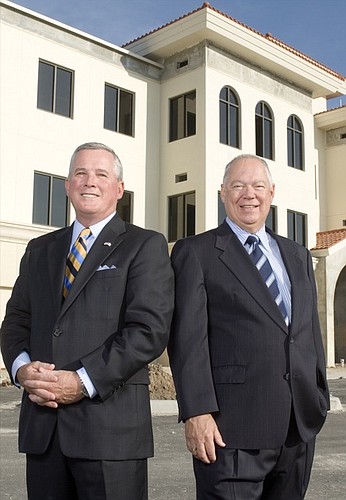- December 23, 2024
-
-
Loading

Loading

If the large banks are too big to fail, are local community banks too small to survive?
That's the question bankers are asking themselves as they face another challenging year. Despite economic stabilization, many banks continue to struggle with loans that customers aren't paying back.
“If the banks can have strong capital levels and strong asset quality, we can ride this thing through,” says Don York, president of Shamrock Bank of Florida in Naples.
With six bank failures since Jan. 2009, Collier County has been the hardest-hit area of the Gulf Coast. Altogether in that period, 16 banks have failed from Tampa to Naples.
“It's going to be another difficult year,” says York, who has been in banking since 1961. “We're a real estate-based market and as real estate goes, so goes the local economy.”
But a growing number of the 64 banks headquartered from Tampa to Naples have started to repair their balance sheets and reported recent improved profitability, according to data from the Federal Deposit Insurance Corp. For the year through Sept. 30, 21 banks based on the Gulf Coast have been profitable this year compared with 12 in the same period a year ago.
Most bankers agree that more bank failures are likely in 2011, but they're probably not going to rival the spectacular multi-billion-dollar busts such as Orion Bank and Bank of Florida.
There are plenty of potential buyers, ranging from stronger Florida banks to private equity investors and out-of-state banks that want a presence in Florida because of population-growth projections and the state's rich deposits. The bidding for banks has risen to the point that some deals may not require the FDIC to intervene.
“We don't think the economy is going to be where we'd like it to be, but we do see improvement,” says Pablo Veintimilla, Collier County market president for Fort Lauderdale-based Stonegate Bank. Stonegate acquired Hillcrest Bank and Partners Bank in Naples with the help of the FDIC and it is planning to acquire Southwest Capital Bank in Fort Myers without the FDIC's assistance.
“We still believe that Southwest Florida is a great market to be in,” Veintemilla says. “We're long-term players, but we don't have any illusions about next year.”
The political landscape has improved too.
“The message that came out of the election is pro business,” says Scott Greer, BB&T's regional president for Southwest Florida. “I'm a lot more optimistic than I was six or eight weeks ago.”
For example, the recently passed federal tax package includes credits for equipment purchases. “There's a heck of a lot of money on the sidelines waiting for a more pro-business environment,” says Greer. “There's got to be a pent-up demand.”
For healthier community banks, the weeding out of weaker banks presents opportunities to gain market share, says Garrett Richter, president of First National Bank of the Gulf Coast in Naples and a state senator. In the last 10 months, Richter says one-third of the $24 billion in bank deposits in Lee and Collier counties has changed hands.
Most banks have accounted for bad loans, too. “A lot of the banks have already taken charge-offs, so they're taking fewer hits on their write-downs,” Richter says.
“Every bank has probably over-provisioned and over-reserved for financial losses,” says William Valenti, president and CEO of Florida Gulf Bank in Fort Myers. If that's the case, some of that money provisioned for loan losses could flow back to the bottom line.
Valenti says he's seen one barometer improve: deposits in checking accounts at his community bank. “We've seen an 8% to 10% increase compared to a year ago,” he says.
Many of the small and profitable community banks are scattered around the Tampa Bay region. “Hillsborough County has held up better than most areas,” says Bill West, president of the Bank of Tampa. While real estate has been weak, the area is more diversified than in counties further south.
But profits so far have been meager and they've come because of cost reductions and the fact that banks have been able to borrow at super-low rates. Unfortunately, these profits haven't been the result of a surge in business or higher lending rates.
Because real estate is the bread-and-butter business of community banking in Florida, problems in residential and commercial real estate will continue to give bankers fits.
“You think you've got your eye on everything and all of a sudden something bites you,” says York.
“Even if the economy pops back up, there's still going to be the tail of the workouts,” says Charles Murphy, president and CEO of the Bank of Commerce in Sarasota. “We see some positive strides into '11, but you won't see a lot of true growth until 2012 and beyond.”
Kerry Westbrook, senior vice president and chief financial officer at First National Bank of Pasco, cautions that general economic conditions aren't improving fast enough to prevent more bank failures in the state.
“The real estate market is not coming back, interest rates are not increasing and unemployment is not dropping,” he says. “Before the whole industry gets better, the economy is going to have to get better.”